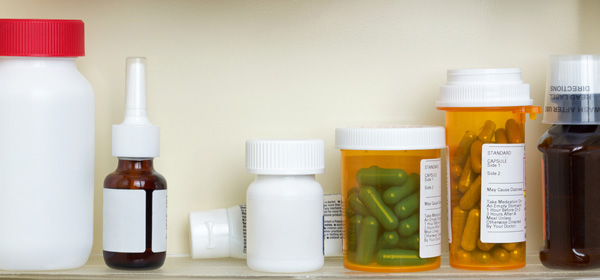There are no doubt times you have gone to your overflowing medicine cabinet and rifled through half-empty pill bottles and pressure packs only to find you are missing some of the very basics.
We’ve compiled a list of some of the bare necessities that you should have in your medicine cabinet to ensure you are never caught short again.
While you are going through your inventory it is also worth tossing out any out-of-date medication.
1. Pain-killers
This is the obvious one and most medicine cabinets will always have a healthy store of paracetamol tablets. There are, however, other pain-relief medications you may need. While paracetamol is Australia’s number one choice for pain relief it always pays to make sure you have an ibuprofen alternative available, for situations where you may want to reduce inflammation. At times pills will not always cut the mustard, particularly with some muscular pain, so it is a good idea to have some topical ointments on hand that works to relax muscles and provide extra comfort.
2. Cough and cold medication
There is nothing worse than having to trudge off to the chemist with your stuffy nose and blocked sinuses when all you feel like doing is curling up in bed until you start to feel better. This is where you will need quite a few medications to cover the full gamut of symptoms. You will need decongestants to fight the ‘stuffy’ feeling (tablets and nasal sprays), cough medicine and some paracetamol or ibuprofen for pain relief (preferably in a day/night combination to give you the right balance for fighting drowsiness/sleeping).
3. Medical equipment
This is pretty basic. You will want to have a thermometer, some tweezers for removing splinters and some general bandages, bandaids and antiseptic cleaning products. This should keep you covered for most minor accidents around the home.
4. Heartburn medication
No matter how much you promise yourself you won’t do it, there will always be mealtimes where you overdo it, and that is when you are likely to suffer from a case of indigestion. As well as over-eating, heartburn can also be triggered by spicy or fatty foods or too much chocolate and alcohol. There are a number of over-the-counter medications available to treat indigestion. Antacids are the most popular, but these can sometimes interfere with the absorption of regular medicines, so you can choose an alginic acid alternative.
5. Anti-diarrhoea treatments
You do not want to find yourself caught short at your medicine cabinet when you are going to have problems making it to your local chemist, which is why anti-diarrhoea treatments are a must for your bathroom. While most bouts of diarrhoea pass eventually and you may be able to ride out the symptoms without medication, it is also important to have rehydration solutions available. These products, such as Gastrolyte and Hydralyte don’t treat the symptoms, but help to replace the fluids lost during bouts of diarrhoea.
6. Constipation treatments
At the other end of the scale, there will also be times when you have trouble passing a bowel movement. Best be sure that you have some laxatives on hand, just in case things become a little blocked.
7. Allergy treatments
There are a range of ailments where it will prove handy to have some antihistamines ready to go. Whether it be hay-fever, eczema, hives or asthma, there are any number of things that can act as triggers and having some fast-acting relief will be a god-send. Also included in this section should be some topical treatments for insect bites.
What do you think? Did we leave anything out? What items do you consider must haves in your medicine cabinet?
Related articles:
Medicine prices to fall
Be Medicinewise
Is cosmetic medicine the answer?

